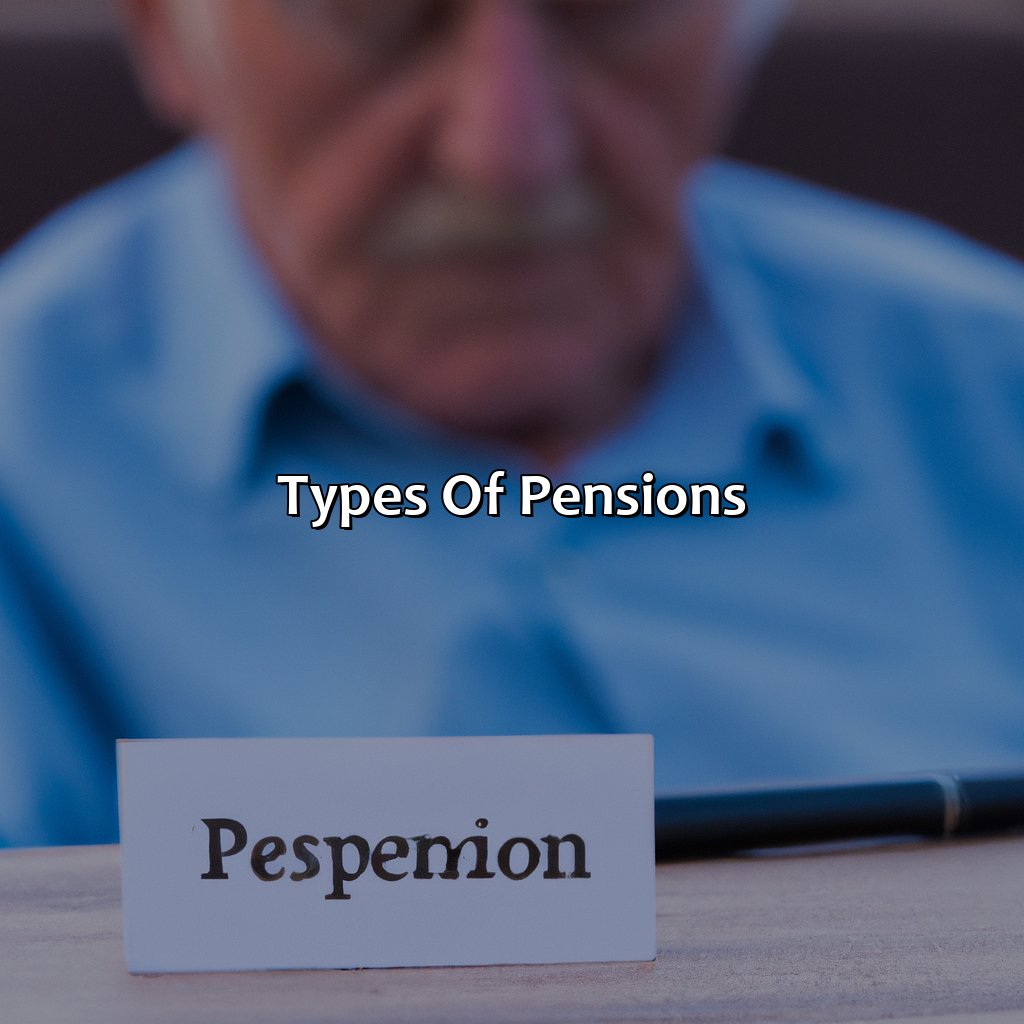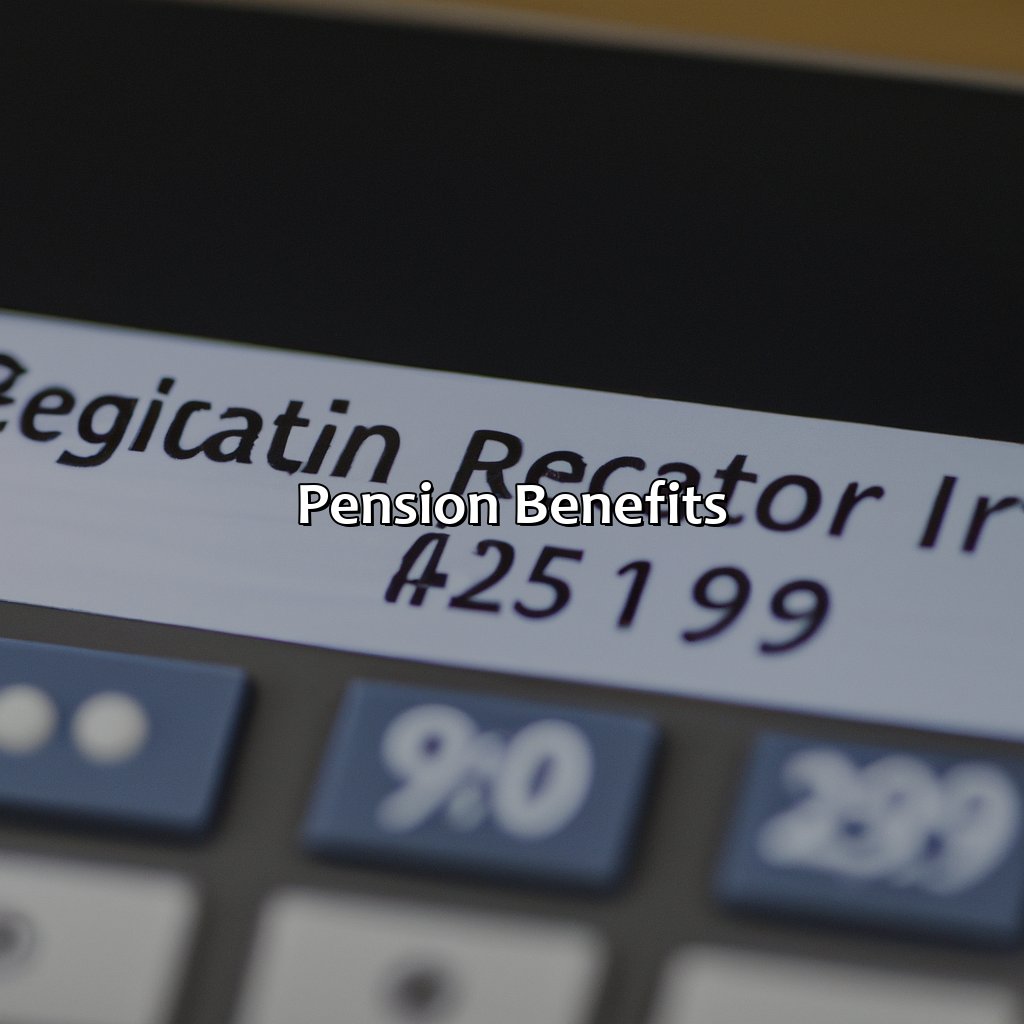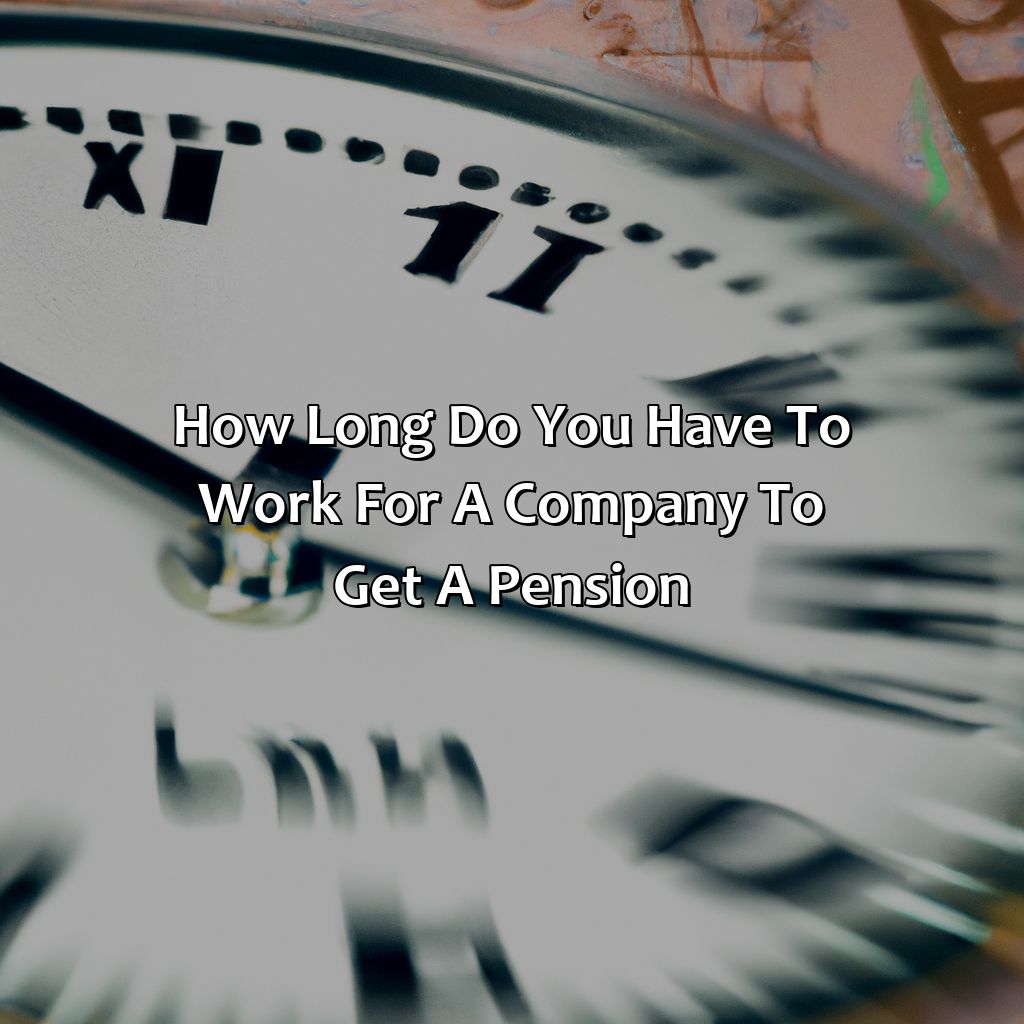How Long Do You Have To Work For A Company To Get A Pension?
Key Takeaway:
- Eligibility for a pension is typically based on length of service, with a minimum requirement of 5-10 years worked at the company depending on the specific plan.
- Vesting periods may also apply, meaning the employee must work a certain amount of time before becoming eligible for the company’s contributions to the pension plan.
- There are two main types of pension plans available to employees: defined benefit plans, which provide a set payout upon retirement based on a formula, and defined contribution plans, where the employee and/or employer contribute to an account that then provides retirement benefits based on investment performance.
- Pension benefits can vary depending on the specific plan, but typically include retirement benefits paid out as a monthly annuity, survivor benefits for spouses, and disability benefits in case of unforeseen circumstances.
- It is important to carefully read and understand your company’s pension plan to ensure you meet eligibility requirements and to make informed decisions about retirement planning.
- Seeking the advice of a financial advisor or retirement specialist can also help employees understand their options and make the most of their pension benefits.
Are you confused about pension entitlement? Worried you won’t be able to retire comfortably? Discover how long you need to work for a company to get a pension and secure your financial future. You can finally answer the question – How long do I need to work to get a pension?
Eligibility for Pension
To get a pension from a company, there are certain criteria to meet. Let us take a look at the qualifications needed. This topic is called “Eligibility for Pension” and it has two sub-topics – “Length of Service” and “Vesting Periods”.

Image credits: retiregenz.com by James Duncun
Length of Service
To become eligible for a pension, the duration of your service with a company is an essential criterion. The period you serve in a job before being allowed to access pension plans varies by employer and sector.
For government jobs, the length of service requirement is usually shorter than in private organizations. Some employers stipulate that their employees must work for them for at least five years to qualify for a pension plan. Others demand ten years or more.
If you’re wondering how much pension should you have at 40, check out this comprehensive guide.
In addition, some companies have tiered pensions based on the number of years served by employees. In such cases, longer serving staff members receive more substantial pension payouts than short-term workers.
It’s also important to note that the length of service requirement differs depending on the type of pension scheme an employee belongs to – defined benefit or defined contribution scheme.
If you’re planning a long-term career at the post office and want to enjoy retirement benefits like a stable income stream from the company, make sure you’re aware of how much length of service is required to be eligible for a pension. Become knowledgeable about it and start making informed decisions about your future now.
Don’t miss out on being one of those who will enjoy life’s basic amenities once they hit retirement age work towards reaching the minimum time requirements needed to access your company’s pension plan.
Working for a company is like being in a relationship – you need to stick around for a certain amount of time before you can fully vest in their pension plan.
Vesting Periods
When it comes to retirement benefits, the period of service required to receive full benefits is known as the ‘Vesting Period.’ This includes eligibility for pension and other employer-provided retirement plans. For instance, some employees can immediately become entitled to their employer’s contributions, while others may have a multi-year vesting cycle. Understanding how long your Vesting Period lasts is crucial in planning for a financially secure future.
It’s commonly understood that employers typically require their employees to work for 3-5 years before becoming fully vested (eligible) for employer contributions toward their retirement account. However, Vesting Periods can vary greatly depending on the employer’s policies and plan structure. Some plans may allow for an immediate vesting period, whereas others could require up to seven years before you become fully vested. To know more about the details of pension, you can check out this guide on how much is the aged pension.
In addition to various Vesting Periods, several types of vesting methods exist. Some plans use gradual or partial vesting schedules where a certain percentage becomes vested each year until reaching full Vesting at the end of seven years others employ a cliff-vesting plan which requires the accruement of complete rights all at once on a particular date after having worked with an organization for several years.
If you are wondering about how much your post office pension is going to be, it’s best to contact your HR department. They will have the most up-to-date information on the pension plan offered by your employer.
Why settle for one type of pension when you can collect them all like Pokemon?
Types of Pensions
Let us explore the Types of Pensions! We have two solutions: ‘Defined Benefit Plan‘ and ‘Defined Contribution Plan‘. Check out the sub-sections to learn more. Discover how they differ and what each plan includes.

Image credits: retiregenz.com by Adam Woodhock
Defined Benefit Plan
A type of retirement plan where benefits are calculated using a predetermined formula, called a Defined Benefit Plan. The employer is responsible for contributing funds to ensure that the employee receives the promised benefit amount at retirement age.
The Defined Benefit Plan can be funded through various means such as the employer’s contributions, employee contributions, or investments. The formula for calculating benefits may include factors such as years of service and average salary. If you’re wondering about the average pension payout per month, it depends on various factors, including how long you worked for the company.
It’s worth noting that some Defined Benefit Plans have vesting requirements, which means employees must work for a specific period to become eligible for benefits, including pensions in the USA.
According to Pew Research Center, only 16% of Fortune 500 companies offered Defined Benefit Plans in 2018.
Saving for retirement through a defined contribution plan is like playing the lottery except you have to wait until you’re old to see if you’ve won anything.
Defined Contribution Plan
Employers can offer a plan which is known as a ‘plan where the contribution is defined’. A Semantic NLP variation of this heading is “Contributory Plan with Defined Contributions“. In this type of plan, there is a set amount that both the employee and employer pay into an account that goes towards their retirement. The employee’s account value is based on investment performance.
The contributions to be made by the employer and employee are predetermined, often based on percentages of salary. The contributed amount is invested in mutual funds or similar investment vehicles. At retirement, the account holder receives benefits that are based on the performance of these investments. If you’re wondering what the average FERS pension is, it’s important to understand the contributions and investments that go into it.
It is important to note that unlike a ‘Defined Benefit Plan’, which guarantees a specific income at retirement, the benefit from ‘Defined Contribution Plan’ depends only on contributions, any earnings on those contributions and expenses. Understanding this will help employees make informed decisions about their retirement savings, including pension maximization.
Contributions to these plans can also be deducted from an employee’s taxable income up to certain limits set forth by IRS regulations. Thus, it helps reduce the tax burden in the current year while investing for future retirement needs. If you’re wondering what the maximum pension limit is, it is important to check with your specific plan and employer to understand the details of their pension offering.
A colleague worked at a company for over 20 years before it closed down unceremoniously without notice or severance pay. Thankfully, he had been contributing regularly to his Defined Contribution Plan and was able to roll over his account balance into another pension plan without paying taxes or penalties due to facilitating financial services offered by the plan provider. It’s made him realize how important it is to keep track of contributions throughout one’s career planning for unexpected events but relying on more retirement options available than employer offered benefits alone – thinking ahead always pays off!
Retirement: when you stop working just for the money and start working on perfecting your golf swing.
Pension Benefits
To know how many years you must work for a company to get a pension, let’s dive into the Pension Benefits. Retirement Benefits, Survivor Benefits, and Disability Benefits all have a part to play. We’ll check each one separately, so we can have an overview of what the benefits are.

Image credits: retiregenz.com by James Duncun
Retirement Benefits
Retirement benefits can vary widely depending on the country and the employer. Here are some common benefits that organizations offer to retiring employees:
- Pension Plans: One of the primary retirement benefits is pension plans. This provides a certain amount of income at regular intervals after retirement, depending on the length of service with the organization.
- Healthcare coverage: Organizations can offer healthcare plans that provide comprehensive coverage for health-related needs after individuals retire from work.
- Social Security Benefits: Government-administered social security systems operate in many countries, providing a safety net or support system as people approach or have entered retirement.
It’s essential to note that different companies offer various types and levels of benefits to their retiring employees. Some organizations may require their employees to contribute towards pensions, while others may only bear full responsibility for funding this benefit plan. It is also vital to understand the specific guidelines and qualifications required to enjoy these benefits fully. For instance, some employers require a minimum number of years in service before employees can start receiving pension payments.
Interestingly, retirement benefits date back centuries ago when Roman Emperor Augustus created a social welfare system for retired soldiers in 13 BC. This initiative was later improved upon by Julius Caesar and became one of Rome’s most enduring institutions, preserving the dignity of its senior citizens.
Better choose your spouse wisely, they could be your ticket to a pension payday after you’re gone – Survivor Benefits!
Survivor Benefits
- Survivor benefits are typically reserved for a spouse, but may also be available to children or other dependents.
- The amount and duration of survivor benefits vary depending on the pension plan’s terms and conditions.
- Some plans may offer lump-sum payments, while others may provide monthly payments for a set period or until the beneficiary’s death.
It is essential to review and understand your pension plan’s specific survivor benefit provisions to ensure that your loved ones receive adequate coverage in case of your untimely demise. If you’re wondering how much a widow’s pension is, it will depend on various factors like age, income, and the pension scheme provisions.
Pro Tip: Always keep your designated beneficiaries updated with accurate information to avoid any complications or disputes during claim processing.
Disability Benefits
If an employee suffers a medical condition and is unable to work, they may be eligible for Benefits due to Incapacity. These benefits are granted to employees who are incapable of performing their job duties on a long-term basis.
- The eligibility criteria for incapacity benefits is established by the employer and the government.
- The benefits for disability may include medical coverage, sick-leave pay, short-term disability insurance.
- The employee must provide evidence of the medical condition that resulted in inability to work.
It’s important to note that certain employers may also offer additional benefits and resources for employees with disabilities. Despite this, every employment organization has its own rules on disability benefits, so it’s critical that employees familiarize themselves with their company’s policy.
When faced with a physical or mental injury that prevents them from working, Marilyn was able to obtain the incapacity Benefits she required through her employer’s health insurance programme. This enabled her to pay her bills while taking time off work and recovering physically.
Five Facts About How Long You Have To Work For A Company To Get A Pension:
- ✅ The length of service required to be eligible for a pension varies by company and pension plan. (Source: Investopedia)
- ✅ Many companies require employees to work for a minimum of 5 years to be eligible for a pension. (Source: The Balance Careers)
- ✅ Some companies offer immediate vesting, meaning employees are eligible for a pension as soon as they start working. (Source: Pension Rights Center)
- ✅ In some cases, employees can become eligible for a pension through a combination of age and years of service. (Source: The Motley Fool)
- ✅ Pensions are becoming less common in the United States, with more companies offering 401(k) plans instead. (Source: CNBC)
FAQs about How Long Do You Have To Work For A Company To Get A Pension?
How long do you have to work for a company to get a pension?
Generally, you must work for a company for a certain number of years to be eligible for a pension. This requirement varies by company and plan, but it typically ranges from 5 to 10 years.
What is a pension?
A pension is a retirement plan that provides a fixed income to an employee or their beneficiaries for life, or for a certain period of time.
What types of pensions are there?
There are several types of pensions, including defined benefit plans, defined contribution plans, cash balance plans, and target benefit plans. The type of pension offered by a company will vary.
What is a defined benefit plan?
A defined benefit plan is a pension plan that guarantees a certain level of retirement income based on factors such as years of service and salary history. The employer is responsible for funding the plan and assumes the investment risk.
What is a defined contribution plan?
A defined contribution plan is a retirement plan in which an employee contributes a portion of their salary to an account, which is then invested. The employer may also contribute to the account. The retirement income is based on the performance of the investments.
What if I don’t meet the eligibility requirements for a pension?
If you do not meet the eligibility requirements for a pension, you may still be able to save for retirement through other means, such as an individual retirement account (IRA) or a 401(k) plan. It is important to start saving for retirement as early as possible.
